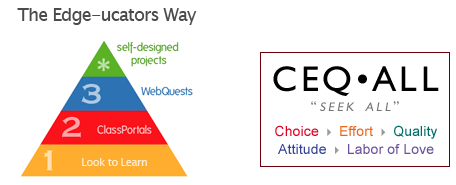Pre-amble
Tom’s first personal homepage / CV, The ozline story & bald self promo (untouched for 10 years)
Early articles
- Working the Web for Education
- Why WebQuests?
- The Learning Power of WebQuest / What WebQuests Are (Really)
Activity Creating Environments
- Filamentality – since 1995
- Web-and-Flow – since 1999 (edge-ucator.com since licensing to DEECD Victoria)
WebQuests – Transforming Information to New Understanding
The WebQuest Designer’s Checklist – especially “Transformative Thinking”
Ah-ha. That’s what we’re after. Yes students can learn a lot of information from the Web, but it offers so much more. When you think you’ve got your WebQuest shaping up, really look hard and long at what you’re asking students to do. Look at their cognition, not their outputs here. What’s going on in the learners’ brains? The usual place in a WebQuest to engage learners in higher order thinking is during that phase when they come back together from developing expertise in their separate roles. The right way to do this is to give the groups a task that requires them to make new meaning, not just to assemble the separate pieces they have learned about. This is the tough part, but it’s the critical piece. Good luck.
Transformations Sampler
- Digital Use Continuum (digital-use-continuum.doc) – from the Digital Life WebQuest
- Group Process Scaffold (terrorism_group.doc) – from the Freedom Fighter or Terrorist WebQuest
- The Relationship Wheel – from the Big Wide World WebQuest (also the “Making Rules” support page)
- Thesis Builder – from the Little Rock 9, Integration 0? WebQuest
- Analysis Grid – from the Tuskegee Tragedy WebQuest
- Group Report – from Searching for China WebQuest
- Non-Violence – from Crool Zone WebQuest
Help pages from Web-and-Flow
- The transformation tree (graphic)
- Transforming Information into Understanding
- Analyzing Part
- Comparing / Contrasting Opinions
- Cause & Effect / Functions
Current Examples
Current Comprehensive Strategies

Look to Learn examples
- Learning Spaces (NBCS video tour)
- History of the World (slideshow)
- Road Rage (PSA video)
- Victory in Syria (photo journalism)
- Text Speak (cartoon)
- The Eye (animation)
- Painting Elephant (video – primary)
Tom’s Archive, stream and prompts + the “About Page“
ClassPortals
Inspiration for ClassPortals
C E Q • A LL / Seek all!
Self-managed Learning Framework for students
- Overview / Rationale
- Profiles (pdf)
- Rubric (pdf)
The Pedagogy

People rightly want to validate the research – as they should – so here are some direct links to fields of research that I find most powerful for 1:1 personal learning: Self-Determination Theory, Cultures of Thinking, Habits of Mind, Flow Theory, Grit and Authentic Happiness.
